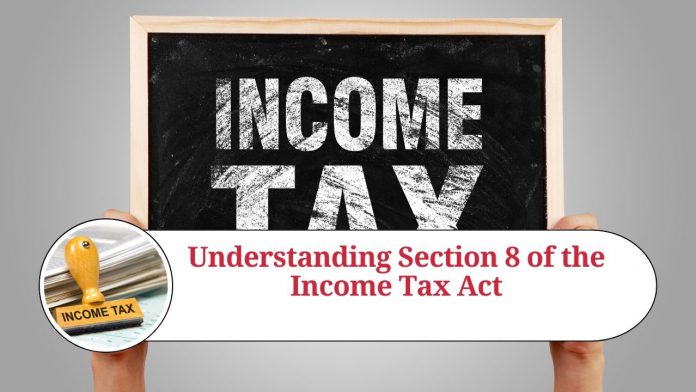Section 8 of the Income Tax Act, 1961 lays down the rules for determining the residential status of an individual for the purpose of taxation. This is an important provision as it decides the extent of tax liability of an individual in India. The residential status of an individual is determined on the basis of the number of days an individual has spent in India in a financial year and the preceding years. In this blog, we will take a closer look at section 8 of the Income Tax Act, its provisions, and the implications of being classified as a resident or non-resident individual.
Provisions of Section 8 of the Income Tax Act:
Section 8 of the Income Tax Act specifies that an individual can be classified into any of the following categories based on the duration of their stay in India:
- Resident and ordinarily resident (ROR): An individual is considered as ROR if they satisfy any one of the following conditions:
- They have been in India for 182 days or more in the financial year.
- They have been in India for 60 days or more in the financial year and have been in India for 365 days or more in the four preceding financial years.
- Resident but not ordinarily resident (RNOR): An individual is considered as RNOR if they satisfy both of the following conditions:
- They have been a non-resident individual in India in nine out of the ten preceding financial years.
- They have been in India for 729 days or less in the seven preceding financial years.
- Non-resident (NR): An individual is considered as NR if they do not satisfy any of the above-mentioned conditions.
Implications of being classified as a resident or non-resident individual:
The classification of an individual as a resident or non-resident has significant implications on their tax liability in India. Residents are subject to tax on their global income, which includes income earned in India as well as income earned outside India. Non-residents, on the other hand, are subject to tax only on income earned in India.
Another important implication of being classified as a resident or non-resident is the availability of various tax benefits and exemptions. For instance, residents are eligible to claim tax benefits on various investments such as provident funds, life insurance, and equity-linked savings schemes. Non-residents, however, are not eligible to claim these benefits.
In conclusion
section 8 of the Income Tax Act is an important provision that determines the residential status of an individual for the purpose of taxation. The classification of an individual as a resident or non-resident has significant implications on their tax liability and eligibility for tax benefits and exemptions. It is therefore essential for individuals to understand the provisions of section 8 and carefully assess their residential status before filing their tax returns.
Read more useful content:
- section 145 of income tax act
- section 10e of income tax act
- section 9 of the income tax act
- section 94b of income tax act
- section 206aa of income tax act
Frequently Asked Questions (FAQs)
Q: What is Section 8 of the Income Tax Act?
A: Section 8 of the Income Tax Act specifies the rules for determining the residential status of an individual for the purpose of taxation.
Q: How is the residential status of an individual determined under Section 8?
A: The residential status of an individual is determined on the basis of the number of days an individual has spent in India in a financial year and the preceding years.
Q: What are the different categories of residential status under Section 8?
A: There are three categories of residential status under Section 8: Resident and ordinarily resident (ROR), Resident but not ordinarily resident (RNOR), and Non-resident (NR).
Q: Who is considered a Resident and ordinarily resident (ROR) under Section 8?
A: An individual is considered as ROR if they satisfy any one of the following conditions:
They have been in India for 182 days or more in the financial year.
They have been in India for 60 days or more in the financial year and have been in India for 365 days or more in the four preceding financial years.
Q: Who is considered a Resident but not ordinarily resident (RNOR) under Section 8?
A: An individual is considered as RNOR if they satisfy both of the following conditions:
They have been a non-resident individual in India in nine out of the ten preceding financial years.
They have been in India for 729 days or less in the seven preceding financial years.
Q: Who is considered a Non-resident (NR) under Section 8?
A: An individual is considered as NR if they do not satisfy any of the above-mentioned conditions.
Q: What are the tax implications of being classified as a resident or non-resident under Section 8?
A: Residents are subject to tax on their global income, which includes income earned in India as well as income earned outside India. Non-residents, on the other hand, are subject to tax only on income earned in India.
Q: What are the tax benefits and exemptions available to residents under Section 8?
A: Residents are eligible to claim tax benefits on various investments such as provident funds, life insurance, and equity-linked savings schemes.
Q: Can an individual change their residential status under Section 8?
A: Yes, an individual can change their residential status under Section 8 based on their stay in India and the preceding years. However, the change in residential status may have tax implications and should be carefully evaluated before making a decision.
Q: How can an individual determine their residential status under Section 8?
A: An individual can determine their residential status under Section 8 by calculating the number of days they have spent in India in a financial year and the preceding years and applying the conditions specified under Section 8.




















